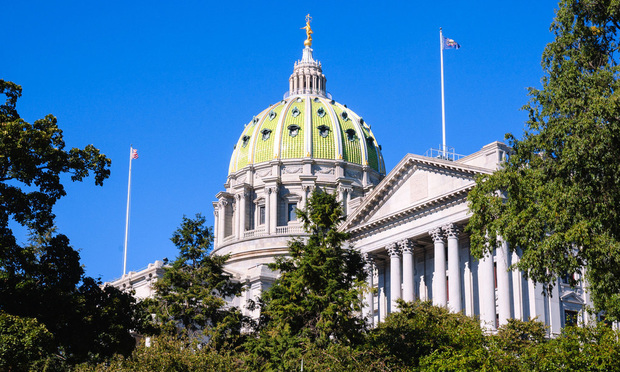Capitol Report
Following is a listing of executive and legislative action for the week of Aug. 6. Members of the state House of Representatives are scheduled to go back to work on Sept. 12. Pennsylvania senators are set to return to session on Sept. 24.
August 09, 2018 at 07:13 PM
4 minute read
 Pennsylvania State Capitol. Photo credit: Zack Frank/Shutterstock.com
Pennsylvania State Capitol. Photo credit: Zack Frank/Shutterstock.com
Unclaimed Property
The Pennsylvania Treasury returned nearly $270 million in unclaimed property to Pennsylvanians during the 2017-18 fiscal year, which is a new record, the Treasury announced.
That amount was up 18 percent from the previous fiscal year, according to a press release.
The Treasury acts as custodian of unclaimed property said to be worth $3.5 billion. Unclaimed property can be items such as abandoned bank, stocks or shareholder accounts, uncashed checks and contents of safety deposit boxes.
“While one in 10 Pennsylvanians has unclaimed property, for some people, this money is crucial,” said Pennsylvania Treasurer Joe Torsella in a press release. “A check you weren't expecting for a few hundred dollars can take care of some tough utility bills, or help a family save for college.
In a separate press announcement, Torsella praised the General Assembly's amendment to the state's Unclaimed Property Law. He said the law has strengthened lost contract standards by making the Treasury's internal policy standard law.
High-Speed Internet
Pennsylvania Gov. Tom Wolf gave Tri-County Rural Electric Cooperative Inc. a $1.5 million grant to place high-speed internet in Potter County.
Potter County is set to have 103 miles of above-ground fiber cable to provide access to broadband internet.
In Potter County, 830 residential, 540 seasonal and 13 commercial customers currently lack access to “adequate” internet speed, according to Wolf's press release. Wolf estimated the construction would create 27 jobs. An additional four full-time permanent jobs were expected to sprout from the project.
In Pennsylvania, there are currently 520,000 people in rural areas without high-speed internet access and some 250,000 people also lack access to speedy internet in urban areas, according to the press release.
LGBTQ Affairs Commission
Gov. Tom Wolf signed an executive order spawning the Pennsylvania Commission on LGBTQ Affairs, which is the first in the nation, according to a press release.
The newly created commission joins the governor's other commissions, including those regarding African-American Affairs, Asian-Pacific American Affairs, Latino Affairs and the Commission for Women.
The 40-member commission will be led by Todd Snovel as its executive director. The other members of the commission include: Anne Wakabayashi as chair; Shaashawn Dial and Tyler Titus as co-vice chairs; and Ben Allatt, Rich Askey, Mark Barbee, Chris Bartlett, Rosemary Browne, Patricia Bucek, Kathy Cameron, Joanne Carroll, Marc Coleman, Katharine Dalke, Jim DePoe, state Sen. Lawrence Farnese, D-Philadelphia, state Rep. Dan Frankel, D-Allegheny, Elicia Gonzales, Amber Hikes, Jodi Hirsh, Malcolm Kenyatta, Michele Kessler, Jason Landau Goodman, Maryellen Madden, Jere Mahaffey, Michael Mahler, Adil Mansoor, Adanjesús Marín, Sean Meloy, Gerald Montano, Sebastian Pelaez, Brian Patchcoski, Sarah Rosso, Kristin Seale, Adrian Shanker, Henry Sias, state Rep. Brian Sims, D-Philadelphia, Sean Strub, Roberto “Tito” Valdes, Harry Young and Heshie Zinman.
2020 Census
Citing a “soaring prison population that is disproportionately comprised of minorities,” a state representative seeks to introduce a resolution urging the U.S. Census Bureau to change its policy of recording the residence of a jailed person to the correctional facilities they are housed in to instead use their last home address.
In a memo, state Rep. Angel Cruz, D-Philadelphia, said the Census Bureau uses a “usual residence” concept that records a prisoner's residence as the facility where they are incarcerated.
“With a soaring prison population that is disproportionately comprised of minorities, such a decision has the potential to weaken the voting strength in minority communities while giving disproportionate political power to predominantly rural, white areas of our country where facilities are often located,” Cruz said.
Population data compiled by the census is used in assigning the number of congressional seats and Electoral College votes, drawing state and local legislation districts and allocating money in federal funding. •
This content has been archived. It is available through our partners, LexisNexis® and Bloomberg Law.
To view this content, please continue to their sites.
Not a Lexis Subscriber?
Subscribe Now
Not a Bloomberg Law Subscriber?
Subscribe Now
NOT FOR REPRINT
© 2025 ALM Global, LLC, All Rights Reserved. Request academic re-use from www.copyright.com. All other uses, submit a request to [email protected]. For more information visit Asset & Logo Licensing.
You Might Like
View All

Troutman Pepper Says Ex-Associate Who Alleged Racial Discrimination Lost Job Because of Failure to Improve
6 minute read
Over 700 Residents Near 2023 Derailment Sue Norfolk for More Damages
3 minute readTrending Stories
- 1Big Law Firms Sheppard Mullin, Morgan Lewis and Baker Botts Add Partners in Houston
- 2Lack of Jurisdiction Dooms Child Sex Abuse Claim Against Archdiocese of Philadelphia, says NJ Supreme Court
- 3DC Lawsuits Seek to Prevent Mass Firings and Public Naming of FBI Agents
- 4Growth of California Firms Exceeded Expectations, Survey of Managing Partners Says
- 5Blank Rome Adds Life Sciences Trio From Reed Smith
Who Got The Work
J. Brugh Lower of Gibbons has entered an appearance for industrial equipment supplier Devco Corporation in a pending trademark infringement lawsuit. The suit, accusing the defendant of selling knock-off Graco products, was filed Dec. 18 in New Jersey District Court by Rivkin Radler on behalf of Graco Inc. and Graco Minnesota. The case, assigned to U.S. District Judge Zahid N. Quraishi, is 3:24-cv-11294, Graco Inc. et al v. Devco Corporation.
Who Got The Work
Rebecca Maller-Stein and Kent A. Yalowitz of Arnold & Porter Kaye Scholer have entered their appearances for Hanaco Venture Capital and its executives, Lior Prosor and David Frankel, in a pending securities lawsuit. The action, filed on Dec. 24 in New York Southern District Court by Zell, Aron & Co. on behalf of Goldeneye Advisors, accuses the defendants of negligently and fraudulently managing the plaintiff's $1 million investment. The case, assigned to U.S. District Judge Vernon S. Broderick, is 1:24-cv-09918, Goldeneye Advisors, LLC v. Hanaco Venture Capital, Ltd. et al.
Who Got The Work
Attorneys from A&O Shearman has stepped in as defense counsel for Toronto-Dominion Bank and other defendants in a pending securities class action. The suit, filed Dec. 11 in New York Southern District Court by Bleichmar Fonti & Auld, accuses the defendants of concealing the bank's 'pervasive' deficiencies in regards to its compliance with the Bank Secrecy Act and the quality of its anti-money laundering controls. The case, assigned to U.S. District Judge Arun Subramanian, is 1:24-cv-09445, Gonzalez v. The Toronto-Dominion Bank et al.
Who Got The Work
Crown Castle International, a Pennsylvania company providing shared communications infrastructure, has turned to Luke D. Wolf of Gordon Rees Scully Mansukhani to fend off a pending breach-of-contract lawsuit. The court action, filed Nov. 25 in Michigan Eastern District Court by Hooper Hathaway PC on behalf of The Town Residences LLC, accuses Crown Castle of failing to transfer approximately $30,000 in utility payments from T-Mobile in breach of a roof-top lease and assignment agreement. The case, assigned to U.S. District Judge Susan K. Declercq, is 2:24-cv-13131, The Town Residences LLC v. T-Mobile US, Inc. et al.
Who Got The Work
Wilfred P. Coronato and Daniel M. Schwartz of McCarter & English have stepped in as defense counsel to Electrolux Home Products Inc. in a pending product liability lawsuit. The court action, filed Nov. 26 in New York Eastern District Court by Poulos Lopiccolo PC and Nagel Rice LLP on behalf of David Stern, alleges that the defendant's refrigerators’ drawers and shelving repeatedly break and fall apart within months after purchase. The case, assigned to U.S. District Judge Joan M. Azrack, is 2:24-cv-08204, Stern v. Electrolux Home Products, Inc.
Featured Firms
Law Offices of Gary Martin Hays & Associates, P.C.
(470) 294-1674
Law Offices of Mark E. Salomone
(857) 444-6468
Smith & Hassler
(713) 739-1250






